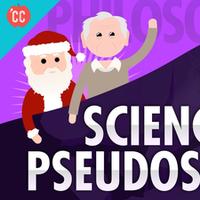08a. Karl Popper, Science, and Pseudoscience. Part 1/2.
● Introduction (00:00)
Female voice: Crash Course Philosophy is brought to you by Squarespace.
Squarespace; share your passion with the world. Hank: Imagine being alive when Albert Einstein was developing his theories of relativity.
Or witnessing the birth of psychology, as Sigmund Freud and psychoanalysis took over the scientific mainstream. The early 1900s was an amazing time for Western science. There was another figure on the intellectual scene when these great minds were at work.
Young philosopher Karl Popper was born in Austria, Freud's home turf, but built his career in Britain, giving serious consideration to the new ways that these and other scientists of the time were thinking about the world. And after looking at different methods that people like Einstein and Freud were using, Popper came to understand that not all scientific achievement was created equal. He ended up making an important distinction, between science and what he called pseudo-science.
And in the process of doing this, he taught us volumes about nature of knowledge itself, and how we can best test it, and challenge it, to bring us closer to the truth. (Crash Course Philosophy Intro)
● Einstein and Freud (01:18)
Emerging at roughly the same point in history, Freud and Einstein both made predictions that they hopes would help us better understand our world.
Freud, concerned with the individual psyche, predicted that our childhood experiences would have a heavy bearing on who we grow up to be. Meanwhile, Einstein waited patiently for a solar eclipse that could disprove his entire general theory of relativity, depending on what it would reveal about how light travels through space. An then there was Karl Popper, born in 1902, who grew up to observe these predictions with keen interest.
As a young scholar, he learned about psychoanalysis theories of Freud, and attended lectures given by Einstein himself about the rules of the universe. And he noticed that these great thinkers used different methods. For example, Popper observed that Freud was able to make just about any data point work in service of his theory. Freud could explain a person's intimacy issues in both terms of not being hugged enough as a child, or in terms of having been hugged too much. Meanwhile, almost any behavior on the part of a female could be explained in terms of penis envy. Evidence to support Freud's theories seemed to be everywhere. But Popper saw that Einstein was making a different type of prediction.
Instead of looking backward, and using past data to "predict" the present, he was looking ahead, and predicting the future states of affairs. Einstein's theory was truly risky, Popper realized. Because, if the future didn't match his predictions, then his theory would be conclusively disproven. If the results of the solar eclipse in 1919 had been different, general relativity would have been finished. Freud, on the other hand, could always just read the past differently, so as to maintain some kind of confirmation of his theory. Suddenly, Popper understood the difference between the science that Einstein was doing, and what Freud was doing, which Popper, rather snootily, referred to as pseudo-science. ● Pseudo-science (02:45)
Now, whether psychology today is considered a hard science or a social science or some other kind might be debatable.
But you won't find many mainstream thinkers who consider it pseudo-science. But still, nearly a hundred years ago, when Popper was reaching these conclusions, no modern philosopher had really characterized what "science" truly meant, and what the implications were for the pursuit of knowledge. The traditional understanding of the scientific method, going all the way back to the ancient Greeks, relied on the belief that, to look at this world with a scientific eye is to observe with no preconceived notions.
You simply look, see what you see, and then develop hypotheses based on those observations. So, you look at a swan, and you notice it's white. You look at another swan; it's white too. You look at enough white swans, and eventually you form the hypothesis that all swans are white. This is what Freud said he was doing, observing relationships. But instead of it being the relationship between swans and colors, it was between particular human phenomena and human behavior. But Popper argued that everyone has preconceived notions of some kind.
We all start with a hunch, whether we admit it or not. After all, what you decide to observe is determined by what you already care about enough to observe in the first place, and the fact that you care about it so much also means that you already have some beliefs about it. So, what does that tell us about Freud? Popper became convinced that methods like his (Freud) that only served to confirm beliefs were pseudo-science, and they can be used to prove anything. Consider the existence of Santa Claus.
If I try to find evidence of Santa's existence, I'm gonna find it, easily. The world is filthy with evidence of Santa Claus. There are presents under the tree on Christmas morning. There's the guy at the mall, and then there are all those songs, and stories, and TV shows, and movies, they combine to confirm your belief in Santa. But Popper would argue that it's only by seeking to disprove Santa's existence that you can demonstrate his unreality. So the question is, when we begin to test a theory, are we looking to confirm it, or disconfirm it?

